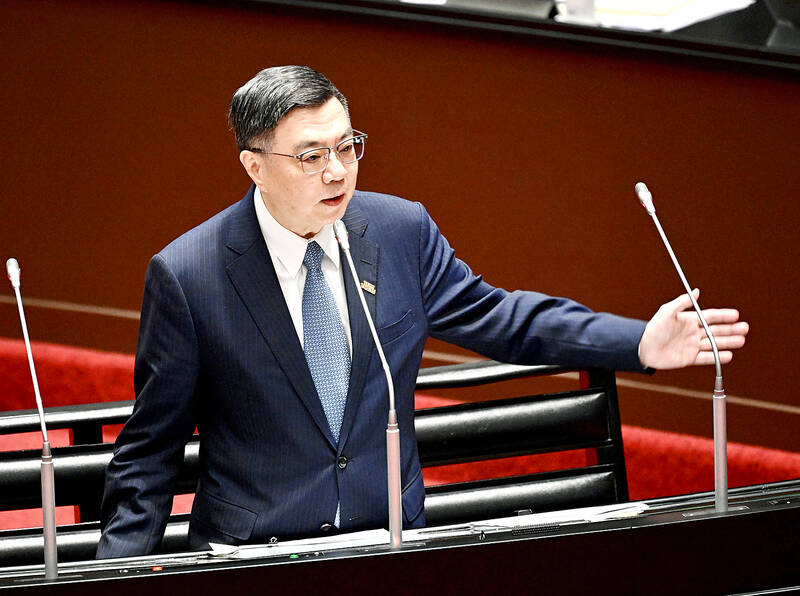Government efforts to prevent large-scale power outages, such as the one that affected the Iberian Peninsula and parts of southern France on Monday, would focus on redundant energy provision, Premier Cho Jung-tai (卓榮泰) said at the Legislative Yuan in Taipei yesterday.
Chinese Nationalist Party (KMT) Legislator Weng Hsiao-ling (翁曉玲) said that the blackout reminded her of the five major power outages during the term of former president Tsai Ing-wen (蔡英文), three of which affected millions of people.
Three of the outages occurred in 2017, one on May 13, 2021, and another on March 3, 2022, which affected 8.38 million, 10 million and 5.5 million residents respectively.

Photo: Lo Pei-de, Taipei Times
Weng said Taiwan has insufficient power, and energy stability is easily disrupted by earthquakes and when relay stations trip, to say nothing of what would happen if the nation were hit by a terrorist attack or embroiled in war.
Power instability results in the paralysis of telecom base stations, which would freeze mobile networks, she said.
Weng asked whether the government was prepared for that contingency and what policies are being discussed or are in place to help the public in such a situation.
President William Lai’s (賴清德) emphasis on whole-of-society resilience should mean that the government is prepared for such events, she added.
Cho said power outages under Tsai’s administration were primarily due to mechanical errors or mishandling by personnel.
The government is preparing for a redundancy in power provision in response to possible power outages due to natural disasters or human error, Cho said.
The information security strategy released by the National Security Council last month also prioritizes critical infrastructure security, including water, electricity, communications, transportation, finance and healthcare systems, he said.
It calls for comprehensive assessments of potential information security risks and countermeasures to protect critical infrastructure, he added.
Weng also asked about the progress of the Ministry of Digital Affairs’ 2023 Forward-looking Project to use Emerging Technologies to Strengthen Communication Networks’ Digital Resilience.
The project, which is estimated to cost NT$550 million (US$17.71 million), aims to build 773 non-geostationary satellite orbit (NGSO) ground stations, 70 satellite base stations within the nation, and three NGSOs abroad.
Minister of Digital Affairs Huang Yen-nun (黃彥男) said that the 773 stations were completed last year.
However, only about 170 stations are operational, given funding issues, he said.
Huang said that the stations were off-limits to civilians, as they are meant to provide the government access to networks that would ensure the smooth running of the government during a war or national disaster.

CHAOS: Iranians took to the streets playing celebratory music after reports of Khamenei’s death on Saturday, while mourners also gathered in Tehran yesterday Iranian Supreme Leader Ayatollah Ali Khamenei was killed in a major attack on Iran launched by Israel and the US, throwing the future of the Islamic republic into doubt and raising the risk of regional instability. Iranian state television and the state-run IRNA news agency announced the 86-year-old’s death early yesterday. US President Donald Trump said it gave Iranians their “greatest chance” to “take back” their country. The announcements came after a joint US and Israeli aerial bombardment that targeted Iranian military and governmental sites. Trump said the “heavy and pinpoint bombing” would continue through the week or as long

TRUST: The KMT said it respected the US’ timing and considerations, and hoped it would continue to honor its commitments to helping Taiwan bolster its defenses and deterrence US President Donald Trump is delaying a multibillion-dollar arms sale to Taiwan to ensure his visit to Beijing is successful, a New York Times report said. The weapons sales package has stalled in the US Department of State, the report said, citing US officials it did not identify. The White House has told agencies not to push forward ahead of Trump’s meeting with Chinese President Xi Jinping (習近平), it said. The two last month held a phone call to discuss trade and geopolitical flashpoints ahead of the summit. Xi raised the Taiwan issue and urged the US to handle arms sales to

State-run CPC Corp, Taiwan (CPC, 台灣中油) yesterday said that it had confirmed on Saturday night with its liquefied natural gas (LNG) and crude oil suppliers that shipments are proceeding as scheduled and that domestic supplies remain unaffected. The CPC yesterday announced the gasoline and diesel prices will rise by NT$0.2 and NT$0.4 per liter, respectively, starting Monday, citing Middle East tensions and blizzards in the eastern United States. CPC also iterated it has been reducing the proportion of crude oil imports from the Middle East and diversifying its supply sources in the past few years in response to geopolitical risks, expanding

Pro-democracy media tycoon Jimmy Lai’s (黎智英) fraud conviction and prison sentence were yesterday overturned by a Hong Kong court, in a surprise legal decision that comes soon after Lai was jailed for 20 years on a separate national security charge. Judges Jeremy Poon (潘兆初), Anthea Pang (彭寶琴) and Derek Pang (彭偉昌) said in the judgement that they allowed the appeal from Lai, and another defendant in the case, to proceed, as a lower court judge had “erred.” “The Court of Appeal gave them leave to appeal against their conviction, allowed their appeals, quashed the convictions and set aside the sentences,” the judges